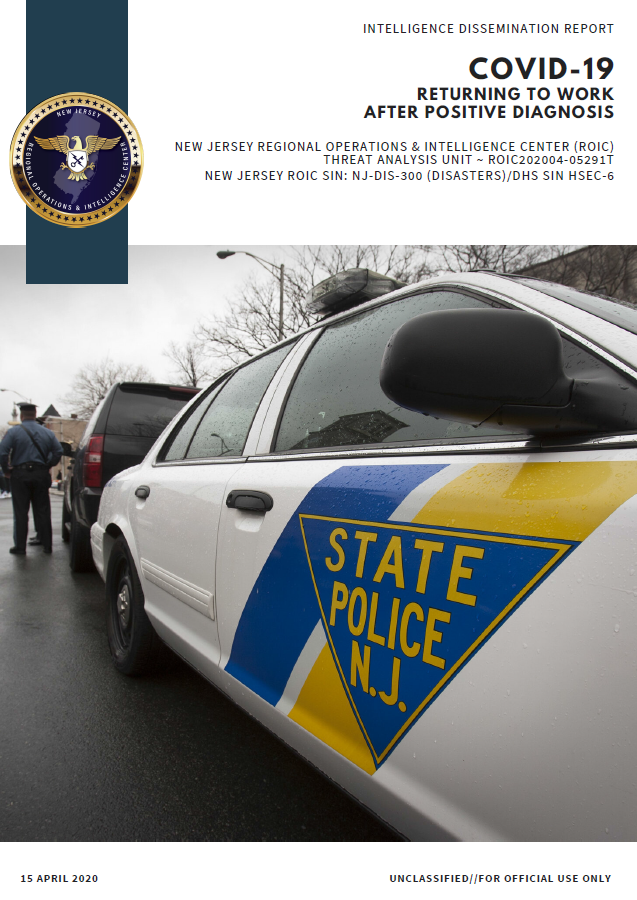The New Jersey Regional Operations & Intelligence Center (ROIC) conducted research regarding the process necessary for successful recovery from COVID-19. This research and subsequent analysis focused on proper return-to-work procedures for first responders, while ensuring the safety of all. Although limited data is available specifically referencing first responders, numerous international scientific studies provide best practices for determining an individual’s ability to safely resume their duties. Links for more information are provided throughout this report.
THE AFTERMATH OF COVID-19 INFECTION
Doctors in Hong Kong have found that people who recover after being infected with COVID-19 can be left with substantially weakened lung capacity, some gasping for air hen walking at a fast pace or engaging in activities requiring elevated cardio activity. It is unknown whether these individuals had pre-existing conditions; however, gradual introduction to extensive physical activity is recognized as a best practice when reentering the workforce.
Analyst Comment: Due to both the physical nature of the job and the inherent danger encountered when responding to calls for service, the recovery process from COVID-19 may be especially difficult to navigate for first responders. This may be a significant factor in determining fitness-for-duty and gauging when individuals should be medically cleared to return to full capacity in the workforce.
GUIDELINES FOR DISCONTINUATION OF QUARANTINE
Many questions have arisen regarding the appropriate time for individuals to return to work following a positive COVID-19 diagnosis. A recent study from Johns Hopkins University featured in the journal Annals of Internal Medicine reports that 97.5 percent of people who develop COVID-19 related symptoms will do so within 11.5 days of exposure, supporting current guidance for the 14 day isolation period issued by the Centers for Disease Control (CDC). The study also estimated that per 10,000 individuals isolated for 14 days roughly 101 would develop symptoms after discontinuing quarantine. For more information on this study, please refer to this link: Johns Hopkins University
GUIDELINES FOR FIRST RESPONDERS RETURNING TO WORK
Guidelines specific to first responders were posted on EMS One. This guidance provides the following and can be referenced on this link: EMS One
Asymptomatic individuals may return to work after 14 days from exposure. An individual with symptoms, but a negative COVID-19 test, may have a different illness and is permitted to return to work following resolution of those symptoms. A symptomatic individual who tests positive for COVID-19 “needs to remain in isolation until the illness resolves and repeat testing confirms negative status.”
ASYMPTOMATIC AND PRE-SYMPTOMATIC CONDITIONS
Numerous studies have been conducted documenting COVID-19 infection in both patients who never developed symptoms of the disease (asymptomatic) and those who do not yet exhibit symptoms at the time of the test (pre-symptomatic). Due to the lack of testing of patients in both categories, this body of research is still in its infancy.
Although the risk of transmitting COVID-19 is greatest in those who are symptomatic, asymptomatic and pre-symptomatic individuals have transmitted the virus to otherwise healthy individuals. Anthony Fauci, director of the National Institute of Allergy and Infectious Disease, recently found that between 25% and 50% of people infected with COVID-19 may never show symptoms or fall ill — but can still transmit the illness to others. This significantly increases the likelihood of transmission, as asymptomatic individuals may never be aware they have COVID-19 and may not take the same precautions as those who have tested positive for the virus. For more information, please refer to this link: Business Insider

